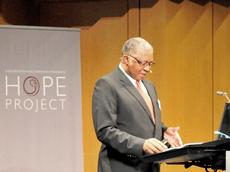Africa on the rise
Russel Botman, Rector and Vice-Chancellor of Stellenbosch University, South Africa visited ETH Zurich to speak about the role universities play in developing Africa’s future. Collaboration among higher education institutions worldwide can make a difference.

Africa has long carried the reputation of being a continent of slow economic and social development. Yet, analysts have recently noted that the international discourse has shifted from “Afro-pessimism to Afro-optimism”. The continent has been showing positive economic growth and is increasingly becoming a more attractive investment destination.
Africa’s progress has mainly relied on the export of primary sources, particularly to fast-industrializing countries such as China, India and Russia. In fact, primary resources make up 80 percent of the continent’s exports, clearly the highest proportion in the world. This is not enough to sustain growth in the long-term, however. Even including the rise in resources like agriculture, manufacturing, construction and services, Africa still sits low on the UNDP’s Human Development Index. Of the world’s 42 under-developed countries, 35 are African.
The question is how to keep the wheel turning. Russel Botman strongly believes that higher education is the engine of sustainable development and that it is a vital component in driving the economy, strengthening society and reinforcing effective governments. More specifically, Botman is a proponent of the idea that science should be the key driver in Africa’s development. Hence, the imp0rtance of fostering collaboration and forming “knowledge coalitions” among higher education institutions within Africa and abroad. “Africa’s scientific research output has shown a decrease from 1 percent in the mid-1980’s to 0.7 percent a decade later. Considering the crucial role that collaboration has played in the history of knowledge, re-encouraging a collaborative culture among academics could help put research results back on track. For this reason, we are prioritizing the development of sustainable and long-term academic networks at Stellenbosch University,” explains Botman. A recent food security study on starch by Samuel Zeeman of ETH Zurich, Jens Kossmann of Stellenbosch University and Alison Smith of the United Kingdom’s John Innes Centre demonstrates such collaboration.
Partnering with African academics
“Africans can be valuable contributors and not just recipients,” says Russel Botman. “But it will take a mind shift in this direction to create solid partnerships with academia within and beyond Africa.” One of the main challenges is to change the perception of African academia by keeping an open dialogue. Students nationwide and worldwide must be made aware of its potential and understand that the door is open for new ideas and innovation.
There are obstacles to overcome, which will require effective communication
and transparency to break negative barriers. At ETH Zurich, young students are
very eager to create a new future and there could be a lot of potential in
looking towards Africa to do so. ETH Zurich has already begun the dialogue,
initiating partnerships through research various projects. For instance,
researchers Michael Stauffacher and Christian Pohl were instrumental in
conceptualizing the TsamaHub’s community
engagement project, which led to a successful funding proposal to South Africa’s
National Research Foundation.
Taking social responsibility
Botman is of the view that universities should not be ivory towers, but should serve society as engaged institutions, and should shape their students to be global citizens and critical change agents. “At Stellenbosch University we want to make a difference in society through academic excellence,” says Botman. The university’s Hope Project, through which the institution’s core activities– research, teaching and community interaction– demonstrates this social engagement as it focuses on eradicating poverty and related conditions, contributing to human dignity and health, consolidating democracy and human rights, promoting peace and security and balancing a sustainable environment with a competitive industry in South Africa and the rest of the continent.
Following Botman’s speech, a panel discussion took place between Russel Botman, Lino Guzzella (Rector ETH Zurich), Antonio Loprieno (Rector University of Basel) and Pauline Mujawamariya (African Innovation Foundation, Zurich). Addressing the topic of social responsibility, the panellists concluded that African universities differentiate themselves from those in Europe by placing a strong emphasis on social mandate. Higher education institutions in Europe tend to strive towards autonomy, focusing on institutional excellence and competition. All of panellists agreed that institutions in Europe and Africa can learn from each other in this regard. European institutions can serve as coaches to institutions in Africa when it comes establishing excellence in education and research. And as social responsibility is heavily on the minds of today’s young students, European institutions could take this into consideration and perhaps shift from an autonomous role to one more socially engaged.
Stellenbosch University
Stellenbosch University (SU) is one of 23 public universities in South Africa, situated 50km from Cape Town. Having 10 faculties spread over five campuses in the region, SU is home to 28’000 students, a third of whom are at post-graduate level and 3’000 of whom come from more than 100 countries. The University has 3’000 permanent staff members, including 939 academics. With emphasis on research, its vision is to be inclusive, innovative and future-oriented – a place of excellence with a welcoming culture characterised by equity and diversity. In 2012, SU was named South Africa’s most research-productive academic institution for the third consecutive time by the country’s Department of Higher Education and Training.







READER COMMENTS